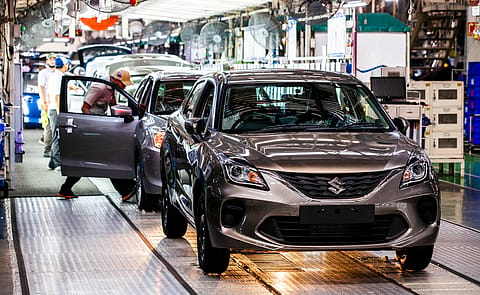Talks with govt underway on 6 airbags, 3-point seatbelts: Maruti Suzuki
Although Maruti's vast customer base in entry-level cars can help alleviate the price hike post-implementation of the six-airbags mandate, it has little hope of the segment recovering.

Maruti Suzuki India Limited (MSIL), India’s largest maker of passenger vehicles, says that the Society of Indian Automobile Manufacturers (SIAM) is in talks with the government over the current timelines for implementing six airbags and three-point seatbelts in passenger vehicles. “SIAM is taking up this issue with the government, not just for six airbags, but also for three-point seatbelts in the backseat, because that is also required now—if as a carmaker, you are putting six airbags without installing seat belts, then you are not serving any useful purpose. So there has to be a timeline for that as well,” explains RC Bhargava, chairman, MSIL. Bhargava adds all of this is currently under discussion by SIAM with the government. “We will have to wait for the final conclusion.”
Road safety experts have flagged that mandating the installation of six airbags in a country where wearing rear seatbelts is unheard of can be counterproductive. "The six airbags in passenger vehicles should be made mandatory once 85% of the people start wearing rear seat belts. Once this figure is crossed pan-India, the government should go ahead making this provision of six airbags mandatory. Otherwise, it will become counterproductive and we will lose more lives," says KK Kapila, president emeritus, International Road Federation (IRF). According to Kapila, seat belts are the primary restraint devices in a crash. "Global studies have shown that if an airbag is deployed without having the seat belt on, it can cause severe injuries and even death," he adds.
MSIL, with the largest portfolio of small, entry-level vehicles, earlier welcomed the decision of deferring the mandate by a year, remarking that it will give enough time for carmakers to make amends. “Industry had been seeking postponement because there was not enough time (to comply) and the market was down and it is great that the government has recognised the validity of what we were saying and they have acted very supportively of the industry,” Bhargava was quoted saying earlier. He also adds that the deferment will also give enough time for carmakers to make any modifications in the chassis to accommodate six airbags.
While Bhargava and MSIL did not divulge the contours of the company’s strategy to comply with the mandate next year, industry observers are of the view that the smaller cars—the S-Presso for instance—in the portfolio will have to undergo structural alterations to fit six airbags. Observers also add that the mandate will result in a price hike, which will inevitably be passed on to the customers. “Adding four airbags would cost an additional ₹8,000-10,000—which would result in an additional burden on small car buyers, especially considering steep increases in car prices due to hikes in commodity prices. It also involves making changes in car design layout warranting the time required by OEMs,” reads a note from ICICI Direct. However, the brokerage firm also notes that the move will be a tad positive for MSIL due to its vast customer base in entry-level cars (MSIL has a market share of about 64% in the passenger car segment).
However, some estimate that the incremental cost of the vehicle is going to be a lot more. Hemal Thakkar, director, transport, logistics and mobility, CRISIL, for instance, estimates that the carbuyer could be looking at an increment of anywhere between ₹40,000-50,000, even more, if the car model needs to be altered structurally. A repercussion of the incremental cost was palpable when Bhargava of MSIL presented a bleak outlook for the small car market. According to him, despite the automobile market set to “grow by eight per cent”, the hatchback segment will continue to degrow in FY24. Bhargava also notes that the overall hatchback segment has been on a downward slope for the last three years. “Hatchback volumes have fallen by 27-28% and inflation has only made it worse. I expect the small-car segment to further decline next year,” he adds.